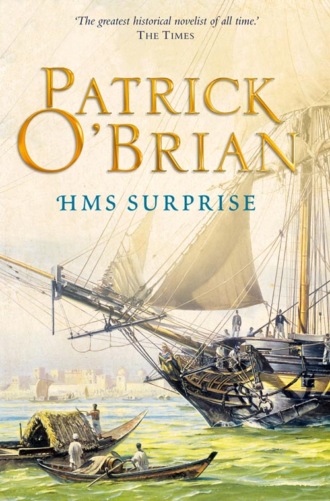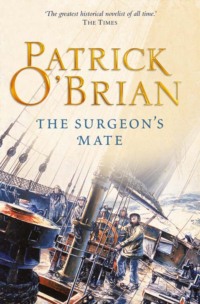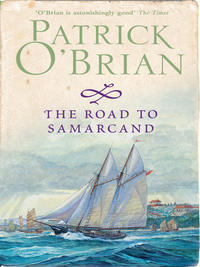
Полная версия
HMS Surprise
Sophia was right: these were indeed the thoughts that flooded into Stephen’s mind at the name of that unlucky tree – these and a great many more, as he sat silently by the glow of the fire. Not that they had far to travel; they hovered most of the time at no great distance, ready to appear in the morning when he woke, wondering why he was so oppressed with grief; and when they were not immediately present their place was marked by a physical pain in his midriff, in an area that he could cover with the palm of his hand.
In a secret drawer of his desk, making it difficult to open or close, lay docketed reports headed Villiers, Diana, widow of Charles Villiers, late of Bombay, Esquire, and Canning, Richard, of Park Street and Coluber House, co. Bristol. These two were as carefully documented as any pair of State suspects working for Bonaparte’s intelligence services; and although much of this mass of paper had come from benevolent sources, a good deal of it had been acquired in the ordinary way of business, and it had cost a mint of money. Stephen had spared no expense in making himself more unhappy, his own position as a rejected lover even clearer.
‘Why do I gather all these wounds?’ he wondered. ‘With what motive? To be sure, in war any accession of intelligence is an advance: and I may call this a private war. Is it to persuade myself that I am fighting still, although I have been beaten out of the field? Rational enough, but no doubt false – too glib it is.’ He uttered these remarks in Catalan, for being something of a polyglot he had a way of suiting his train of thought to the language that matched it best – his mother was a Catalan, his father an Irish officer, and Catalan, English, French, Castilian came to him as naturally as breathing, without preference, except for subject.
‘How I wish I had held my tongue,’ thought Sophie. She looked anxiously at Stephen as he sat there, bent and staring into the red cavern under the log. ‘Poor dear thing,’ she thought, ‘how very much he is in need of darning – how very much he needs someone to look after him. He really is not fit to wander about the world alone; it is so hard to unworldly people. How could she have been so cruel? It was like hitting a child. A child. How little learning does for a man – he knows almost nothing: he had but to say “Pray be so good as to marry me” last summer and she would have cried “Oh yes, if you please”. I told him so. Not that she would ever have made him happy, the…’ Bitch was the word that struggled to make itself heard; but it struggled in vain. ‘I shall never love that pagoda-tree again. We were so pleasant together, and now it is as though the fire had gone out … it will go out, too, unless I put another log on. And it is quite dark.’ Her hand went out towards the bell-pull to ring for candles, wavered, and returned to her lap. ‘It is terrible how people suffer,’ she thought. ‘How lucky I am: sometimes it terrifies me. Dearest Jack…’ Her inner eye filled with a brilliant image of Jack Aubrey, tall, straight, cheerful, overflowing with life and direct open affection, his yellow hair falling over his post-captain’s epaulette and his high-coloured weather-beaten face stretched in an intensely amused laugh: she could see the wicked scar that ran from the angle of his jaw right up into his scalp, every detail of his uniform, his Nile medal, and the heavy, curved sword the Patriotic Fund had given him for sinking the Bellone. His bright blue eyes almost vanished when he laughed – all you saw were shining slits, even bluer in the scarlet flush of mirth. Never was there anyone with whom she had had such fun – no one had ever laughed like that.
The vision was shattered by the opening of the door and a flood of light from the hall: the squat thick form of Mrs Williams stood there, black in the doorway, and her loud voice cried, ‘What, what is this? Sitting alone in the dark?’ Her eyes darted from the one to the other to confirm the suspicions that had been growing in her mind ever since the silence had fallen between them – a silence of which she was perfectly aware, as she had been sitting in the library close to a cupboard in the panelling: when this cupboard door was open, one could not help hearing what was said in the small drawing-room. But their immobility, their civil, surprised faces turned towards her, convinced Mrs Williams of her mistake and she said with a laugh, ‘A lady and gentleman sitting alone in the dark – it would never have done in my time, la! The gentlemen of the family would have called upon Dr Maturin for an explanation. Where is Cecilia? She ought to have been keeping you company. In the dark … but I dare say you were thinking of the candles, Sophie. Good girl. You would not credit, Doctor,’ she said, turning towards her guest with a polite look; for although Dr Maturin was scarcely to be compared with his friend Captain Aubrey, he was known to be the possessor of a marble bath and of a castle in Spain – a castle in Spain! – and he might very well do for her younger daughter: had Cecilia been sitting in the dark with Dr Maturin she would never have burst in. ‘You would not credit how candles have risen. No doubt Cecilia would have had the same idea. All my daughters have been brought up with a strict sense of economy, Dr Maturin; there is no waste in this house. However, if it had been Cecilia in the dark with a beau, that would never have done; the game would not have been worth the candle, ahem! No, sir, you would never believe how wax has gone up since the beginning of the war. Sometimes I am tempted to turn to tallow; but poor though we are, I cannot bring myself to it – at least not in the public rooms. However, I have two candles burning in the library, and you shall have one: John need not light the sconces in here. I was obliged to have two, Dr Maturin, for I have been sitting with my man of business all this time – nearly all this time. The writings and the contracts and the settlements are so very long and complicated, and I am an infant in these matters.’ The infant’s estate ran far beyond the parish boundaries, and tenants’ babies as far away as Starveacre, on being told ‘Mrs Williams will come for you’, would fall mute with horror. ‘But Mr Wilbraham throws out some pretty severe reflections on us all for our dilatoriness, as he calls it, though I am sure it is not our fault, with Captain A so far away.’
She bustled away for the candle, pursing her mouth. These negotiations were drawing out in length, not from any petulance on the part of Mr Wilbraham, but because of Mrs Williams’s iron determination not to part with her daughter’s virginity or her ten thousand pounds until an ‘adequate provision’, a binding marriage-settlement, had been signed, sealed, and above all, the hard cash delivered. It was this that was hanging fire so strangely: Jack had agreed to all the conditions, however rapacious; he had tied up his property, pay, prospects and future prize-money for the benefit of his widow and any offspring of this union for ever, in the most liberal way, as though he had been a pauper; but still the actual money did not appear, and not a step would Mrs Williams move until it was in her hands, not in promises, but in minted gold or its copper-bottomed, Bank of England guaranteed equivalent.
‘There,’ she said, coming back and looking sharply at the log which Sophia had put on the fire. ‘One will be enough, will it not, unless you wish to read? But I dare say you still have plenty to talk about.’
‘Yes,’ said Sophia, when they were alone again. ‘There is something I should like to ask you. I have been meaning to draw you aside ever since you came … It is dreadful to be so ignorant, and I would not have Captain Aubrey know it for the world; and I cannot ask my mother. But with you it is quite different.’
‘One may say anything at all to a medical man,’ said Stephen, and a look of professional, anonymous gravity came over his face, partly overlaying its look of strong personal affection.
‘A medical man?’ cried Sophia. ‘Oh, yes. Of course: certainly. But what I really meant, dear Stephen, was this war. It has been going on for ever now, apart from that short break. Going on for ever – and oh how I wish it would stop – for years and years, as long as I can remember; but I am afraid I have not always paid as much attention as I should. Of course, I do know it is the French who are so wicked; but there are all these people who keep coming and going – the Austrians, the Spaniards, the Russians. Pray, are the Russians a good thing now? It would be very shocking – treason no doubt – to put the wrong people in my prayers. And there are all those Italians, and the poor dear Pope: and only the very day before he left, Jack mentioned Pappenburg – he had hoisted the flag of Pappenburg, by way of a ruse de guerre; so Pappenburg must be a country. I was despicably false, and only nodded, looking as wise as I could, and said, “Ah, Pappenburg.” I am so afraid he will think me ignorant: which of course I am, but I cannot bear him to know it. I am sure there are quantities of young women who know where Pappenburg is, and Batavia, and this Ligurian Republic; but we never did such places with Miss Blake. And this Kingdom of the Two Sicilies: I can find one on the map, but not the other. Stephen, pray tell me the present state of the world.’
‘Is it the state of the world, my dear?’ said Stephen, with a grin – no professional look left at all. ‘Well now, for the moment, it is plain enough. On our side we have Austria, Russia, Sweden and Naples, which is the same as your Two Sicilies; and on his he has a whole cloud of little states, and Bavaria and Holland and Spain. Not that these alliances are of much consequence one side or the other: The Russians were with us, and then against us until they strangled their Czar, and now with us; and I dare say they will change again, when the whim bites. The Austrians left the war in ’97 and then again in the year one, after Hohenlinden: the same thing may happen again any day. What matters to us is Holland and Spain, for they have navies; and if ever this war is to be won, it must be won at sea. Bonaparte has about forty-five ships of the line, and we have eighty-odd, which sounds well enough. But ours are scattered all over the world and his are not. Then again the Spaniards have twenty-seven, to say nothing of the Dutch; so it is essential to prevent them from combining, for if Bonaparte can assemble a superior force in the Channel, even for a little while, then his invasion army can come across, God forbid. That is why Jack and Lord Nelson are beating up and down off Toulon, bottling up Monsieur de Villeneuve with his eleven ships of the line and seven frigates, preventing them from combining with the Spaniards in Cartagena and Cadiz and Ferrol; and that is where I am going to join him as soon as I have been to London to settle one or two little points of business and to buy a large quantity of madder. So if you have any messages, now is the time; for, Sophie, I am upon the wing.’ He stood up, scattering crumbs, and the clock on the black cabinet struck the hour.
‘Oh, Stephen, must you go?’ cried Sophie. ‘Let me brush you a little. Will you not stay to supper? Pray, do stay to supper – I will make you toasted cheese.’
‘I will not, my dear, though you are very kind,’ said Stephen, standing like a horse as she brushed at him, turned down his collar and twitched at his cravat – since his disappointment he had grown less nice about his linen; he had given up the practice of brushing his clothes or his boots, and neither his face nor his hands were particularly clean. ‘There is a meeting of the Entomological Society that I might just be able to attend, if I hurry. There, there, my dear, that will do: Mary and Joseph, I am not going to Court – the entomologists do not set up for beaux. Now give me a kiss, like a good creature, and tell me what I am to say – what messages I am to give to Jack.’
‘How I wish, oh how I wish I were going with you … It would be of no use begging him to be prudent, not to take risks, I suppose?’
‘I will mention it, if you choose. But believe me, honey, Jack is not an imprudent man – not at sea. He never takes a risk without he has weighed it very carefully: he loves his ship and his men too much, far too much, to run them into any unconsidered danger – he is not one of your wild, hit-or-miss, fire-eating rapparees.’
‘He would not do anything rash?’
‘Never in life. It’s true, you know; quite true,’ he added, seeing that Sophia was not wholly persuaded that Jack at sea and Jack ashore were two different persons.
‘Well,’ she said, and paused. ‘How long it seems; everything seems to take so very long.’
‘Nonsense,’ said Stephen, with an assumed liveliness. ‘Parliament rises in a few weeks’ time; Captain Hamond will go back to his ship, and Jack will be thrown on the beach again. You will see as much of him as your heart could desire. Now what shall I say?’
‘Give him my dearest love, Stephen, if you please; and pray, pray, take the greatest care of yourself, too.’
Dr Maturin walked into the Entomological Society’s meeting as the Reverend Mr Lamb began his paper on Certain Non-Descript Beetles found on the Shore at Pringlejuxta-Mare in the Year 1799. He sat down at the back and listened closely for a while; but presently the gentleman strayed from his theme (as everyone had known he would) and began to harangue the gathering on the hibernation of swallows; for he had found a new prop for his theory – not only did they fly in ever-decreasing circles, conglobulate in a mass and plunge to the bottoms of quiet ponds, but they also took refuge in the shafts of tin-mines, ‘of Cornish tin-mines, gentlemen!’ Stephen’s attention wandered, and he glanced over the restless entomologists; several he knew – the worthy Dr Musgrave, who had favoured him with a prime carena quindecimpunctata; Mr Tolston, of stag-beetle fame; Eusebius Piscator, that learned Swede – and surely the plump back and powdered queue looked familiar? It was odd how one’s eye must take in and store innumerable measurements and proportions; a back was almost as recognisable as a face. This applied also to gait, stance, lift of head: what countless references at every turn! This back was turned from his with an odd, unnatural twist, and its owner’s left hand was raised, resting on his jaw in such a way as to shield his face: no doubt it was this twist that had caught his eye; yet in all their dealings he had never seen Sir Joseph writhe himself into such an attitude.
‘… and so, gentlemen, I believe I may confidently state that the hibernation of swallows, and of all the other hirundines, is conclusively proved,’ said Mr Lamb, with a defiant glare at his audience.
‘I am sure we are all very grateful to Mr Lamb,’ said the chairman, in an atmosphere of general discontent, with some cross shuffling of feet and murmuring. ‘And although I am afraid that we are now short of time – perhaps not all the papers can be read – allow me to call on Sir Joseph Blaine to favour us with his remarks on A True Gynandromorph recently added to his Cabinet.’
Sir Joseph half rose in his place and begged to be excused – he had left his notes behind – he was not perfectly well, and would not try the patience of the meeting by trying to speak without ’em – he begged pardon, but thought he would retire. It was only a passing indisposition, he said, to reassure the company: the company would not have cared if it had been the great spotted leprosy – three entomologists were already on their feet, eager for immortality in the society’s Proceedings.
‘What am I to infer from this?’ asked Stephen of himself, as Sir Joseph passed with a distant bow; and during the following account of luminous beetles, lately received from Surinam – a fascinating account, which he should certainly read with great attention later – a cold presentiment formed in his bosom.
He carried this presentiment with him from the meeting; but he had not walked a hundred yards before a discreet messenger accosted him and gave him a card with a cipher and an invitation not to Sir Joseph’s official apartments but to a little house behind Shepherd Market.
‘How good of you to come,’ said Sir Joseph, seating Stephen by the fire in what was clearly his library, study and drawing-room; it was comfortable, even luxurious, in the style of fifty years before; and cases of butterflies alternated with pornographic pictures on the walls – emphatically a private house. ‘How truly kind.’ He was nervous and ill at ease, and he said ‘how truly kind’ again: Stephen said nothing. ‘I begged you to come here,’ Sir Joseph went on, ‘because this is my private shall I say refuge, and I feel I owe you a private explanation. When I saw you this evening I was not expecting you; my conscience gave me a rude jerk – it put me about strangely, because I have exceedingly disagreeable news for you, news that I should rather have any other man deliver but that necessarily falls to me. I had prepared myself for it at our meeting tomorrow morning; and I should have done it well enough, I dare say. But seeing you suddenly there, in that atmosphere … To put it in a word,’ he said, putting down the poker with which he had been teasing the fire, ‘there has been a grave indiscretion at the Admiralty – your name was mentioned and insisted upon at a general meeting, in direct connexion with the action off Cadiz.’ Stephen bowed, but still said nothing. Sir Joseph, looking at him covertly, went on. ‘Of course, I drowned the indiscretion at once, and afterwards I let it be understood that you were aboard by chance, that you were bound for some undefined Eastern region in a scientific or quasi-diplomatic capacity in which a commission would be necessary for your status, for your eventual negotiations, citing the precedent of Banks and Halley – that its connexion with this incident was purely fortuitous and coincidental, occasioned only by the need for extreme haste. This I have put about as the true inside story, far more secret than the interception, known only to the initiated and not to be divulged on any account: it should answer with most of the sailors and civilians who were present. The fact remains that in spite of my efforts you are somewhat blown upon; and this necessarily calls our whole programme into question.’
‘Who were the gentlemen present?’ asked Stephen. Sir Joseph passed him a list. ‘A considerable gathering … There is a strange levity,’ he said coldly, ‘a strange weak irresponsibility, in playing with men’s lives and a whole system of intelligence in this manner.’
‘I entirely agree,’ cried Sir Joseph. ‘It is monstrous. And I say so with the more pain since it is I who am partly at fault. I had minuted the First Lord on the subject and I wholly relied upon his discretion. But no doubt I had allowed myself to become too much accustomed to a chief upon whom I could rely without question – there never was a closer man than Lord Melville. A parliamentary government is hopeless for intelligence: new men come in, politicians rather than professionals, and we are all to seek. Your dictatorship is the only thing for intelligence: Bonaparte is far, far better served than His Majesty. But I must not evade the second unhappy issue. Although it will be a matter of public notoriety in a few days’ time, I feel I must tell you myself that the Board means to treat the Spanish treasure as droits of the Crown – that is to say, it will not be distributed as prize-money. I did everything in my power to avert this decision, but I am afraid it is irrevocable. I tell you this in the faint hope that it might prevent you from committing yourself to any course of action on the contrary assumption; even a few days’ warning is perhaps better than none at all. I also tell you, with the utmost regret, because I am aware that you have another interest in this – in this matter. I can only hope, alas without much conviction, that my warning may have some slight … you follow me. And as for my personal expressions of extreme regret, intense chagrin and concern, upon my word, I scarcely know how to phrase them with a tenth of the force they require.’
‘You are very good,’ said Stephen, ‘and I am most sensible of this mark of confidence. I will not pretend that the loss of a fortune can be a matter of indifference to any man: I do not feel any emotion other than petty vexation at the moment, though no doubt I shall in time. But the interest to which you so obligingly refer is another matter: allow me to make it clear. I particularly wished to serve my friend Aubrey. His agent absconded with all his prize-money; the court of appeal reversed the condemnation of two neutral vessels, leaving him £11,000 in debt. This happened when he was on the point of becoming engaged to a most amiable young woman. They are deeply attached to one another; but since her mother, a widow with considerable property under her own control, is a deeply stupid, griping, illiberal, avid, tenacious, pinchfist lickpenny, a sordid lickpenny and a shrew, there is no hope of marriage without his estate is cleared and he can make at least some kind of settlement upon her. That was the position I flattered myself I had dealt with; or rather that you, a kind fate and the conjuncture had dealt with for me. That was the understanding of all concerned. What am I now to tell Aubrey when I join him at Minorca? Does anything accrue to him from this action at all?’
‘Oh yes, certainly: there will certainly be an ex gratia payment: indeed, it might clear the debts you mention, or very nearly: but it will not be wealth, oh dear me no; far from it. But, my dear sir, you speak of Minorca. Do I collect that you mean to continue with our original plan, in spite of this wretched unnecessary contretemps?’
‘I believe so,’ said Stephen, studying the list again. ‘There is so much to be gained from our recent contacts; so much to be lost by not … In this case it seems to me essentially a question of time: as far as common loose talk and confidential rumour are concerned, I must in all probability outrun it, since I sail tomorrow night. Information of this seeping kind is unlikely to move as fast as a determined traveller; and in any event you have dealt with the more obvious prattlers. This is the only name here I am afraid of ’ – pointing to the list – ‘He is, as you know, a paederast. Not that I have anything against paederasty myself – each man must decide for himself where beauty lies and surely the more affection in this world the better – but it is common knowledge that some paederasts are subject to pressures that do not apply to other men. If this gentleman’s meetings with Monsieur de La Tapetterie could be discreetly watched, and above all if La Tapetterie could be neutralised for a week, I should have no hesitation in carrying on with our former arrangement. Even without these precautions, I doubt I should put it off; these are the merest conjectures, after all. And it is no use sending Osborne or Schikaneder – Gomez will put his head into no man’s hands but mine; and without that contact the new system falls to pieces.’
‘That is true. And of course you understand the local position far better than any of us. But I do not like to think of you running this added risk.’
‘It is very slight, if indeed it exists at the moment – negligible if I have a fair wind and if you caulk this leak, this purely conjectural leak. For this one voyage it does not weigh at all, compared with the common daily hazards of the trade. Afterwards, if silly chatter has its usual effect, clearly I shall not be useful for some time – not until you rehabilitate me, ha, ha, with your quasi-diplomatic or scientific mission to the Cham of Tartary. When I come back from it I shall publish such papers on the cryptogams of Kamschatka that no one will ever set the mark of intelligence upon my head again.’
Конец ознакомительного фрагмента.
Текст предоставлен ООО «ЛитРес».
Прочитайте эту книгу целиком, купив полную легальную версию на ЛитРес.
Безопасно оплатить книгу можно банковской картой Visa, MasterCard, Maestro, со счета мобильного телефона, с платежного терминала, в салоне МТС или Связной, через PayPal, WebMoney, Яндекс.Деньги, QIWI Кошелек, бонусными картами или другим удобным Вам способом.









